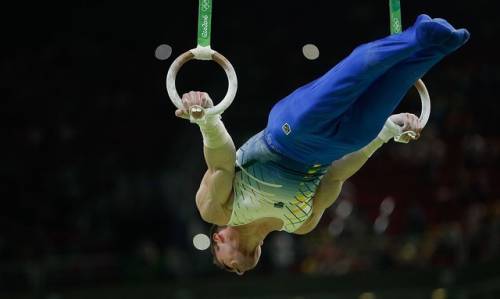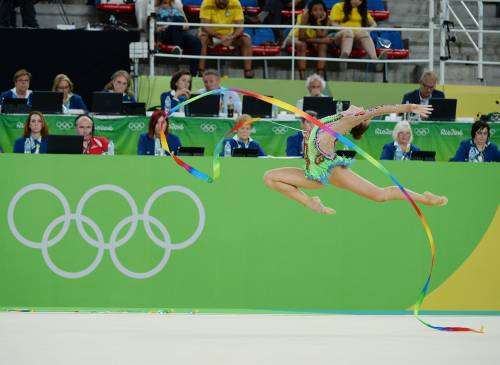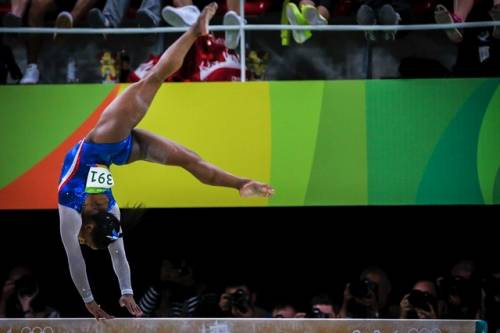Olympic Sports
Welcome back to our Olympics series, where we focus on a variety of sports featured at the Summer Olympic Games and why we think you should watch them. This article will focus on Gymnastics.
Gymnastics has featured at every Olympic Games since 189 in Athens, but for the first 32 years only male athletes were allowed to compete in the events. Amsterdam in 1928 saw the first female gymnasts take part at a Summer Olympics. There are three separate subdivisions in gymnastics: Artistic, which has been at the Olympics since the beginning, Rhythmic Gymnastics, which was first introduced to the Olympics in 1984 at the Los Angeles Games, and finally trampolining, which was not introduced until the Sydney Games in 2000. In Paris, the artistic and trampoline events will take place at the Bercy Arena, whilst the Rhythmic events will take place at the Porte de La Chapelle Arena.
Artistic Gymnastics is often the most well-known form of gymnastics. It sees an athlete performing a short routine on a piece of apparatus. There are 6 different pieces of apparatus used by the men and 4 by the women. Medals are available on each piece of apparatus, as well in team and all-around events. In each event, there is a qualification stage before the top athletes compete in the final to decide the medals.
First up to take a deeper look at is the Floor Exercise, which a feature of both the men’s and women’s competition. In this event, gymnasts perform short routines on a 12 x 12 metre sprung floor. In their routine they will perform multiple passes and must visit each corner at least once. Points will be awarded for difficulty as well as execution. The women’s event is performed to music and includes more dance and acrobatic skills than the men’s event which is performed without music. Israel’s Artem Dolgopyat won gold in the men’s event at the Tokyo Games, and he will be looking to repeat this feat after winning at the 2023 World Artistic Gymnastics Championships in Antwerp. In the Women’s Floor Event, Jade Carey from the US finished above Italian athlete Vanessa Ferrari for gold. Simone Biles won at the 2023 World Artistic Gymnastics Championships and will be looking to improve on her Tokyo performance in this event this summer.
The Vault is the other event that both men and women compete in. Gymnasts run down a 25m runway before launching themselves off a springboard, over the platform and twist or somersault through the air before landing within a set of lines. Gymnasts must be powerful to get a good launch, and then skilful to twist and land correctly. Shin Jea-hwan from South Korea took gold in Tokyo, but British athlete Jake Jarman won at the recent World Artistic Gymnastics Championships in Antwerp. Brazilian Rebeca Andrade reigned supreme in the Women’s Vault, one of two medals for the Brazilians in Gymnastics in Tokyo.
The first men’s only event is the Pommel Horse. with their weight on their hands, gymnasts swing their legs in circular motions around the horse (a 1.6 metre form with 2 handholds in its middle), before performing a dismount. Max Whitlock successfully defended his gold from Rio in 2016 and will be hoping to win a third consecutive medal in this event in Paris in what will be his final Olympic Games.
The Uneven Bars is a women’s only event. Two parallel bars are above the floor at different heights; gymnasts perform various rotations and twists, as well as transitions between the bars, before finishing their routine with a dismount. Nina Derwael from Belgium topped the podium in Tokyo and will hope to repeat this feat in Paris but after a serious shoulder injury and Chinese gymnast Qiu Qiyuan coming off the back of a victory in Antwerp in 2023, this could be a difficult task indeed.
Next up for the male gymnasts: the Still Rings. Two rings are suspended above the floor, so that the gymnast can swing freely below them. Routines end with a dismount and must contain at least one strength move. China dominated this event in Tokyo, with Liu Yang claiming gold and You Hao winning silver. The former has continued his strong form since the Tokyo Games, winning at the 2023 World Championships in Antwerp, so will hope to claim gold once again in Paris.
The Parallel Bars is the third of the male only events. In this event, men perform short routines on two bars 1.75 metres above the floor and only shoulder-width apart, displaying swings, balances and jumps, before finishing with a dismount. China won yet another gold in this event, with Zou Jingyuan taking the top step of the podium. Looking forward to Paris, Tokyo runner-up Lukas Dauser won at the 2023 World Championships and will be hoping to carry this form into the summer.
The final men’s event is the Horizontal Bar. In this one, a stiff, metal bar above the ground is used for a short routine of turns, twists and releases, before an impressive dismount. Japanese gymnast, Daiki Hashimoto, won on home soil three years ago, and continued his winning ways in Antwerp in 2023.
The Balance Beams is a women’s only event, which, like the Men’s Still Rings, was an event dominated by China. Guan Chenchen beat out Tang Xijing for the gold, with superstar Simone Biles claiming bronze in Tokyo. Biles won her fourth World Championship gold in Antwerp in 2023, so will come into the Paris Games this summer.
There are also two more medals available in the Artistic events, which are the Team All-Around and Individual All-Around. In the individual event, athletes compete on every piece of apparatus and their scores on each are combined. This medal is perhaps regarded as the ultimate goal of Olympic Gymnastics. Japanese gymnast Daiki Hashimoto achieved gold on home soil in Tokyo in the men’s event, and after winning the All-Around in both the 2022 and 2023 World Artistic Gymnastics Championships. In the Women’s All Around, Sunisa Lee won Gold for the US, but with Simone Biles looking back to her best, winning her sixth gold at the World Championships last time out, she is looking favourite for gold in Paris.
In the Team All-Around, teams of 4 will compete in both men’s and women’s events, where one athlete per country will compete on each piece of apparatus and their scores will be added together to produce the overall standings. The US perhaps disappointedly lost out to Russia for the gold medal in Tokyo, but nobody should write them off to bounce back and win gold this summer.
 Rhythmic Gymnastics, a women-only discipline, sees gymnasts perform a routine to music with apparatus such as hoops, balls, clubs, and ribbons. Routines include typical gymnastic moves including tumbles and stands in addition to throws and other use of the apparatus. There are Individual and Group All-Around events for gymnasts to claim medals in. In Tokyo in the Group event, the Bulgarians, perhaps surprisingly, won gold, with Russian athletes claiming silver, despite the Russians winning the previous five golds in this event.
Rhythmic Gymnastics, a women-only discipline, sees gymnasts perform a routine to music with apparatus such as hoops, balls, clubs, and ribbons. Routines include typical gymnastic moves including tumbles and stands in addition to throws and other use of the apparatus. There are Individual and Group All-Around events for gymnasts to claim medals in. In Tokyo in the Group event, the Bulgarians, perhaps surprisingly, won gold, with Russian athletes claiming silver, despite the Russians winning the previous five golds in this event.
Similarly, Russia had previously dominated in the Individual, again winning the previous five golds at the Olympics, but Linoy Ashram from Israel came out on top to claim gold in Tokyo.
A reasonably new, but extremely exciting discipline, trampolining sees two events take place, the Men’s Individual and the Women’s Individual. After a number of bounces to generate height, gymnasts perform a short routine containing somersaults and twists whilst reaching heights of up to 8 metres, before they are marked on: difficulty, execution, flight time, and horizontal displacement to determine the overall winner. At the Tokyo Games, Belarussian athlete, Ivan Litvinovich claimed gold ahead of China’s Dong Dong, and New Zeland’s Dylan Schmidt, in the men’s event. In the Women’s Individual event, China dominated, with Zhu Zueying and Liu Lingling took gold and silver, respectively, with Bryony Page from Great Britain taking bronze. The latter, however, will come into Paris 2024 with high hopes after winning gold at the 2023 Trampoline Gymnastics World Championships in Birmingham.
The Olympics is the pinnacle of Gymnastics disciplines, and the events offer some of the most technical and difficult athletic displays in any sport.
This year’s Summer Olympics will take place from 26 July to 11 August in Paris, France. You can easily keep up-to-date and stay informed on every gymnastics event happening at Paris 2024 by creating a Fixture Calendar account or downloading our App.
Why not also check out our This Week in Sport blog, for a rundown or the top sporting events happening each week or get a useful overview of the 15 most exciting events taking place each month with our Fixture Calendar newsletter here.
Harry Stephens, May 2024
Photos by Fernando Frazão, Ilgar Jafarov, Danilo Borges